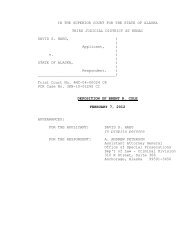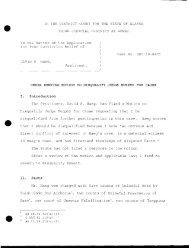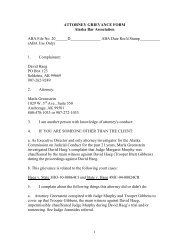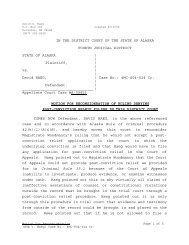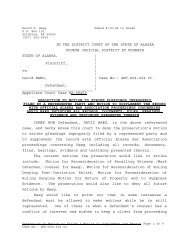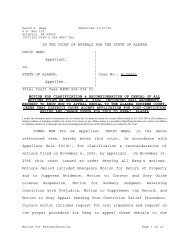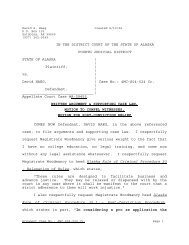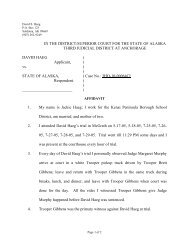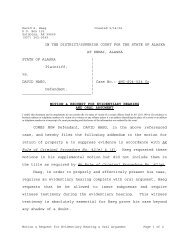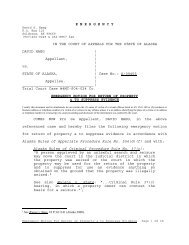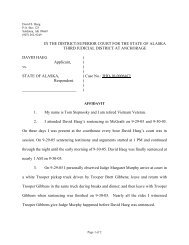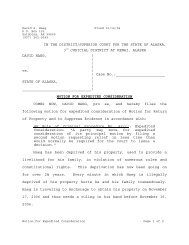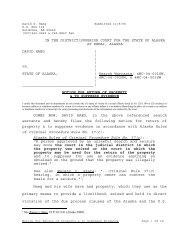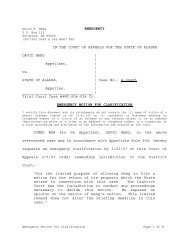PCR Exhibits - Alaska State of Corruption
PCR Exhibits - Alaska State of Corruption
PCR Exhibits - Alaska State of Corruption
Create successful ePaper yourself
Turn your PDF publications into a flip-book with our unique Google optimized e-Paper software.
suspected him <strong>of</strong> illegally fishing in closed waters. The supreme court held<br />
that the plaintiff was not entitled to compensation for the temporary seizure <strong>of</strong><br />
his fishing boat because the seizure <strong>of</strong> property suspected <strong>of</strong> having been used<br />
to break the law falls squarely within the government’s police power. Id. at<br />
1155.<br />
The seizure <strong>of</strong> the ATV in the question has aspects <strong>of</strong> both a taking and an<br />
exercise <strong>of</strong> police power. On one hand, it looks like an exercise <strong>of</strong> police power<br />
because <strong>Alaska</strong> has made it illegal for people under 21 to possess ATV’s. The<br />
<strong>of</strong>ficer confiscated the ATV and the hearing <strong>of</strong>ficer upheld the seizure because<br />
Hunter was under 21. On the other hand, Hunter did not engage in any<br />
criminal conduct, for there was no penalty associated with his possession <strong>of</strong><br />
the ATV other than its forfeiture. Similarly, there is no evidence that he used<br />
the ATV to engage in any criminal activity. This distinguishes his situation<br />
from the plaintiff in Waiste. By the same token, the fact that <strong>Alaska</strong> raised a<br />
lot <strong>of</strong> revenue by confiscating and selling ATV’s suggests that the taking was for<br />
the benefit <strong>of</strong> the public.<br />
III. Equal Protection – 40%<br />
Hunter may have a claim based on equal protection. Article I, Section 1 <strong>of</strong> the<br />
<strong>Alaska</strong> Constitution provides that “all persons are… entitled to equal rights,<br />
opportunities, and protection under the law.”<br />
Equal protection analysis begins with the question <strong>of</strong> whether two similarly<br />
situated groups are being treated disparately. Stanek v. Kenai Peninsula<br />
Borough, 81 P.3d 268, 270 (<strong>Alaska</strong> 2003). Hunter has a good argument that he<br />
is part <strong>of</strong> a group that is being treated disparately because the law<br />
distinguishes between people under 21 years <strong>of</strong> age and those 21 and over.<br />
The <strong>Alaska</strong> Supreme Court uses a sliding scale to evaluate equal protection<br />
claims. Premera Blue Cross v. <strong>State</strong>, Dept. <strong>of</strong> Commerce, Community & Economic<br />
July 2008 Page 4 <strong>of</strong> 5<br />
Development, Div. <strong>of</strong> Ins., 171 P.3d 1110, 1121 (<strong>Alaska</strong> 2007). The sliding scale<br />
is based on the court’s evaluation <strong>of</strong> three variables. Id.1<br />
A. The First Variable - The Interest Impaired by <strong>Alaska</strong>’s Statute<br />
First, the court must determine what weight it should give the interest<br />
impaired by the challenged statute. Id. The nature <strong>of</strong> the impaired interest is<br />
the most important variable because the state will have a greater or lesser<br />
burden to justify the statute depending on the weight given to the interest. Id.<br />
The interest impaired by <strong>Alaska</strong>’s statute is the right <strong>of</strong> people under 21 to<br />
possess ATV’s. The <strong>Alaska</strong> Supreme Court has not yet had an opportunity to<br />
ascribe a weight to this interest. Hunter could argue that the right is<br />
fundamental or that it should be treated like gender and illegitimacy which<br />
receive intermediate scrutiny. But the court <strong>of</strong> appeals’ decision in Gibson v.<br />
<strong>State</strong>, 930 P.2d 1300, 1302 (<strong>Alaska</strong>. App. 1997), suggests that the interest is at<br />
the low end <strong>of</strong> the scale, for the court concluded the state’s “legitimate” interest<br />
in protecting the health and welfare <strong>of</strong> its citizens merited the infringement <strong>of</strong><br />
individual rights. Id. (claim that prohibition against possessing firearms while<br />
intoxicated violated the state constitution’s guarantee <strong>of</strong> the personal right to<br />
297



